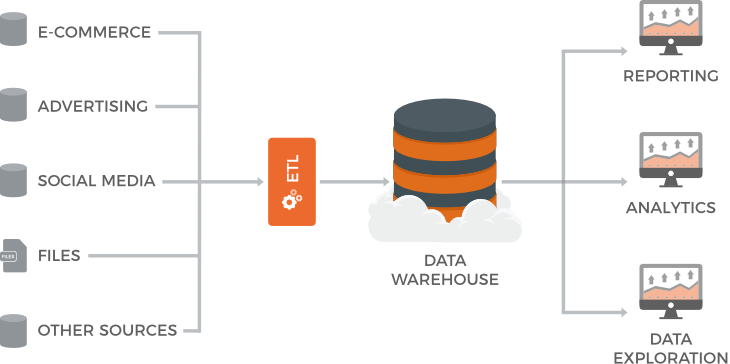Businesses today constantly strive to gain a competitive edge in their marketing efforts. Leveraging their data effectively to create data-driven campaigns is the best way to trump the competition. One of the best tools at their disposal to utilize their data is a data warehouse.
Data warehousing is crucial in enhancing marketing and campaign management by providing a centralized and integrated repository of valuable customer information.
In this blog, we analyze how data warehousing enhances marketing strategies and enables businesses to achieve targeted and impactful campaigns. First, a quick recap of data warehousing.
Understanding data warehousing
Data warehousing refers to collecting, organizing, and storing data from various sources in a central repository. It involves extracting data, transforming it into a standardized format, and loading it into the data warehouse. By consolidating data from multiple sources, such as customer interactions, sales transactions, and online behavior, data warehousing provides marketers with a holistic view of their audience.
But how does collecting and loading data in a single destination help improve marketing campaigns?
Benefits of data warehousing in campaign management
Improved campaign planning and execution
Data warehousing empowers marketers to plan and execute campaigns more effectively. With access to comprehensive customer data and historical campaign results, marketers can make data-driven decisions. They can identify the most responsive segments, determine optimal channels, and personalize their messaging.
Furthermore, data warehousing allows marketers to track and measure campaign performance in real-time, enabling them to make timely adjustments and optimizations. Real time analytics provides faster decision-making at a time when around 37% of managers’ time is spent inefficiently.
Real-time monitoring and tracking of campaign performance
Measuring campaign performance and obtaining real-time insights was a challenge in traditional marketing approaches. Data warehousing solves this problem by providing marketers with real-time monitoring and tracking capabilities. Marketers can monitor key performance indicators (KPIs), such as click-throughs, conversions, and revenue generated, on a granular level. This allows them to gauge their campaigns’ effectiveness and promptly make data-driven decisions.
Personalization and targeted marketing
Personalization is an important component of successful marketing campaigns. Data warehousing facilitates personalized marketing by providing marketers with a deep understanding of individual customer preferences and behaviors. Marketers can use this knowledge to create highly personalized and specific campaigns that resonate with their target audience.
Marketers can significantly improve customer engagement and conversions by delivering the right message at the right time. According to a McKinsey survey, over 90% of customers prefer personalized shopping experiences over generic campaigns.
Optimization of marketing spend
Data warehousing enables marketers to optimize their marketing spend by providing insights into the effectiveness of various marketing channels and campaigns. Marketers can identify high-performing channels by analyzing campaign performance metrics and allocate resources accordingly. They can also identify underperforming campaigns and make necessary adjustments to improve ROI. This data-driven approach to marketing spend optimization helps businesses maximize their return on investment and minimize wasted resources.
A few simple scenarios
Company A: Leveraging data warehousing for customer segmentation
Company A, a leading e-commerce retailer, implemented a data warehousing solution to enhance its marketing efforts. They created a comprehensive customer database by consolidating customer data from their online store, social media platforms, and email marketing campaigns. Using data analytics tools, they segmented their customers based on purchase history, preferences, and engagement levels.
This enabled them to personalize their marketing messages and target specific customer segments with tailored offers. As a result, Company A experienced a significant increase in customer engagement and a boost in sales revenue.
Company B: Utilizing data warehousing for personalized email campaigns
Company B, a software-as-a-service (SaaS) provider, recognized the power of personalized marketing. They leveraged data warehousing to create a single customer view by integrating data from their CRM system, website interactions, and customer support interactions.
With this comprehensive customer profile, they designed personalized email campaigns that aligned with each customer’s interests and needs. By tailoring its messaging and offers, Company B achieved higher open and click-through rates, increasing trial sign-ups and conversions.
Best practices for implementing a data warehouse
Establishing clear objectives and goals
Before implementing a data warehousing solution, defining clear objectives and goals is essential. Managers must identify the key business questions they want to be answered with the data warehouse, such as improving campaign effectiveness, enhancing customer segmentation, or optimizing marketing spend. This step helps align the data warehousing efforts with a business’s specific needs.
Ensuring data cccuracy and quality
Data accuracy and quality are paramount for effective data warehousing. Implement data validation processes to ensure the accuracy and consistency of the data. Regularly review and update data cleansing procedures to maintain data integrity and minimize errors.
Implementing robust data governance policies
Establish robust data governance policies to ensure compliance with privacy regulations and protect customer data. Define roles and responsibilities, establish data access controls, and monitor data usage to maintain security and privacy. Data privacy should be of utmost importance, as compromised data can cause millions of dollars in damages.
Regular monitoring and maintenance of the data warehouse
Continuous monitoring and maintenance of the data warehouse are crucial to ensure its optimal performance. Regularly monitor data quality, performance metrics, and system health. Implement proactive measures to address any issues promptly and conduct regular audits to identify areas for improvement.
Final words
Data warehousing has transformed marketing and campaign management by providing a centralized and integrated view of customer data. By leveraging data warehousing tools, marketers can streamline their campaign management processes, improve efficiency, and drive better results.
With the continuous evolution of data warehousing technologies and the integration of AI and ML, the future holds even greater opportunities for marketers to leverage data for enhanced customer experiences and improved campaign outcomes. By embracing data warehousing, businesses can unlock the full potential of their marketing strategies and achieve remarkable results.


